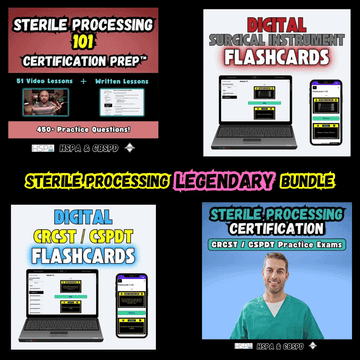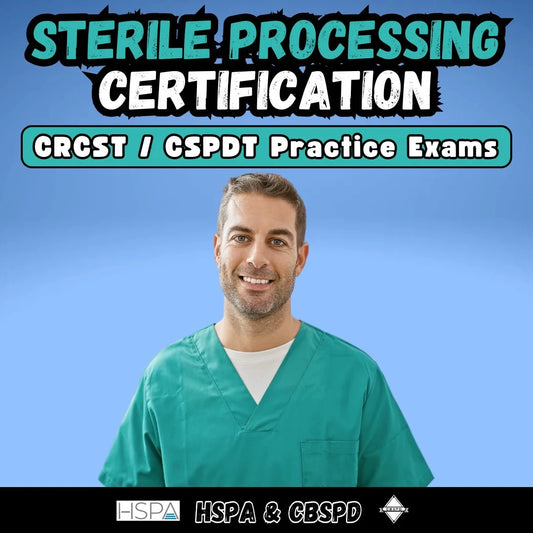Skills of a Sterile Processing Technician
Skills of a Sterile Processing Technician: Essential Abilities for Success
Sterile Processing Technicians (SPTs) play a vital role in healthcare by ensuring that surgical instruments and medical equipment are thoroughly cleaned, sterilized, and maintained. They are responsible for preventing infections and ensuring the safety of both patients and medical staff. To excel in this role, certain skills and qualifications are essential. This article will explore the good skills to have as a sterile processing tech, key sterile processing technician skills, and how you can prepare for a career in this important field. Additionally, we'll touch on resources like sterile processing tech books, the good qualities to have as a sterile processing tech, and opportunities like becoming a travel sterile processing tech.
Core Sterile Processing Technician Skills
Sterile Processing Technicians must possess a combination of technical expertise and personal attributes to thrive in their job. Below are the sterile processing technician skills that are critical to success:
- Attention to Detail One of the most crucial skills for an SPT is attention to detail. Sterilization is a meticulous process that requires careful adherence to protocols and guidelines. A single missed step can compromise patient safety, so being thorough is vital in cleaning, assembling, and inspecting instruments.
- Knowledge of Sterilization Methods SPTs must be familiar with various sterilization techniques, such as steam sterilization, ethylene oxide gas, and low-temperature sterilization. Understanding how and when to apply each method is critical in ensuring the proper sterilization of different medical devices.
- Manual Dexterity Handling small instruments and assembling complex surgical trays requires good hand-eye coordination and manual dexterity. These tasks demand precision, especially when dealing with delicate equipment that must remain sterile.
- Time Management Sterile processing is often done under tight deadlines, especially in busy hospitals or surgical centers. Effective time management ensures that instruments are sterilized and ready for use in a timely manner without compromising the sterilization process.
- Physical Stamina The role of an SPT can be physically demanding. It often involves standing for long periods, lifting heavy trays, and moving equipment throughout the day. Physical stamina is important to manage the rigors of this job while maintaining focus on cleanliness and safety.
- Communication Skills SPTs work closely with nurses, surgeons, and other healthcare professionals. Strong communication skills are essential to ensure that the correct instruments are provided for procedures and to report any issues with equipment or sterilization.
- Problem-Solving Abilities If an issue arises, such as a malfunctioning sterilizer or damaged instrument, SPTs must think quickly and critically to resolve the problem. Effective problem-solving is key to maintaining smooth operations in the sterile processing department.
- Infection Control Knowledge One of the primary responsibilities of an SPT is to prevent infections through proper sterilization. A deep understanding of infection control protocols and best practices is a critical aspect of the role.
Good Qualities to Have as a Sterile Processing Tech
In addition to technical skills, certain personal attributes are essential for an SPT. Here are some of the good qualities to have as a sterile processing tech:
- Patience Sterilization is a process that can’t be rushed. Patience ensures that every step is followed meticulously and that instruments are handled with care.
- Adaptability Healthcare environments are fast-paced and ever-changing. SPTs must be able to adjust to new protocols, equipment, or changes in the surgical schedule with ease.
- Integrity The work of an SPT directly impacts patient safety. Integrity means following protocols and being honest if a mistake occurs. Ensuring that every step of the process is performed correctly is a matter of trust.
- Teamwork Sterile processing departments are often team-driven environments. The ability to collaborate with fellow technicians and other healthcare staff is critical to maintaining the department’s efficiency.
Sterile Processing Technician Qualifications
To become a sterile processing technician, certain qualifications are necessary:
-
High School Diploma or GED
Most entry-level positions require at least a high school diploma or equivalent. -
Certification
While certification is not always required, many employers prefer or require candidates to be certified. The CRCST (Certified Registered Central Service Technician) certification from the Healthcare Sterile Processing Association (HSPA) is one of the most widely recognized credentials in the industry. Another option is the CBSPD (Certification Board for Sterile Processing and Distribution) certification. -
On-the-Job Training or Experience
Many sterile processing technicians gain experience through internships or on-the-job training. Practical experience is essential for learning sterilization protocols and handling equipment. -
Continuing Education
Sterile processing is a field where ongoing education is important. Staying updated on new sterilization techniques, equipment, and industry standards helps SPTs advance in their careers.
Sterile Processing Tech Books and Study Materials
A variety of sterile processing tech books can help both aspiring and experienced SPTs develop their skills and knowledge. Some popular resources include:
- "Central Service Technical Manual" by HSPA – A comprehensive guide covering all aspects of sterile processing.
- "The World of Surgical Instruments" – An excellent resource for inspection and care of surgical instruments.
- "Sterile Tech CRCST Flashcards" – Not a book, but an incredible resource for learning Sterile Processing and prepping for the CRCST certification.
These books are essential for exam preparation, continuing education, or simply expanding your knowledge of the field.
Travel Sterile Processing Tech: A Growing Opportunity
The demand for sterile processing technicians is rising, especially in larger healthcare facilities or regions with shortages. Becoming a travel sterile processing tech offers a unique career path where you can work in different hospitals or clinics, often in various locations across the country. This role comes with flexibility and the opportunity to gain diverse experience. Travel sterile processing techs typically enjoy higher salaries, travel stipends, and other perks due to the demand for their skills.
Conclusion
Being a sterile processing technician requires a unique set of skills, from attention to detail and knowledge of sterilization techniques to the ability to work well under pressure. Additionally, having the good qualities of patience, adaptability, and teamwork further enhances your effectiveness in the role. With proper sterile processing technician qualifications, including certification and practical experience, you can build a rewarding career in this critical healthcare field.
For those who want to advance their knowledge, sterile processing tech books offer valuable insights, while opportunities such as becoming a travel sterile processing tech provide exciting ways to grow professionally.
By focusing on the right skills and qualities, sterile processing technicians ensure that healthcare environments remain safe, efficient, and effective.
Share
Let customers speak for us
from 252 reviewsI took the practice test and I got a 91% on my certification exam!!
This course was the extra boost that I needed in order be confident in passing the exam. Thank you for all the information provided. I even refer to your notes while working.
Very helpful to me I can study any where at my own pace and low cost than going to school...I'm glad that there is something like this online to help anyone who want to pursue their career as a sterile processing tech.
I loved it, it’s very informative and the questions are great, it’s a great resource to purchase if you want to prepare for your certification exam!
I’ve really enjoyed this course so far. It delivers the information in a straightforward, digestible way. The Sterile Guy has compiled a highly effective program. Thanks very much from one highly satisfied customer!
The practice exams are detailed and easy to navigate. Brandon continues to show his passion in this industry by sharing his knowledge with up-and-coming techs. I also recommend investing in his flashcards. It has helped me greatly. Thank you, Brandon!,
These practice quizzes really helped me get the hang of answering questions related to instruments and the processes of preparing them! I even bought them twice cause I ran out of time lol. Super helpful!
I recently completed the Sterile Processing Guy course online and was extremely impressed. The content was clear, well-organized, and easy to follow. It helped me better understand important concepts like decontamination, disinfection, and sterilization. I appreciated how practical and informative the lessons were, it definitely made studying for certification feel more manageable. I highly recommend this course to anyone pursuing a career in sterile processing!
I won’t lie, I failed the first time around. So I decided to buy this practice test and I passed with flying colors my second go. Highly recommend to anyone interested in the CER, it helped a lot!
The flash card quality is amazing! Bravo sir! The card quality is way above average, questions are great! I’m still learning, utilizing these cards and your practice tests. Thanks for all the info!
I passed the CRCST exam. Taking reg sterile guy practice test over and over definitely helped get the job done.
This certification prep course is a must. Great videos with a lot of information and plenty of of practice exams.
These flashcards are so helpful and well put together. Highly recommend!
I'm really happy that I purchased the SP practice exam. I love how if you answer the question incorrectly, the correct answer will include the page number of the text book to find the answer. The questions are literally based on the textbook. I suggested "The Sterile Processing Guy" to my friend that is studying for the exam as well.








